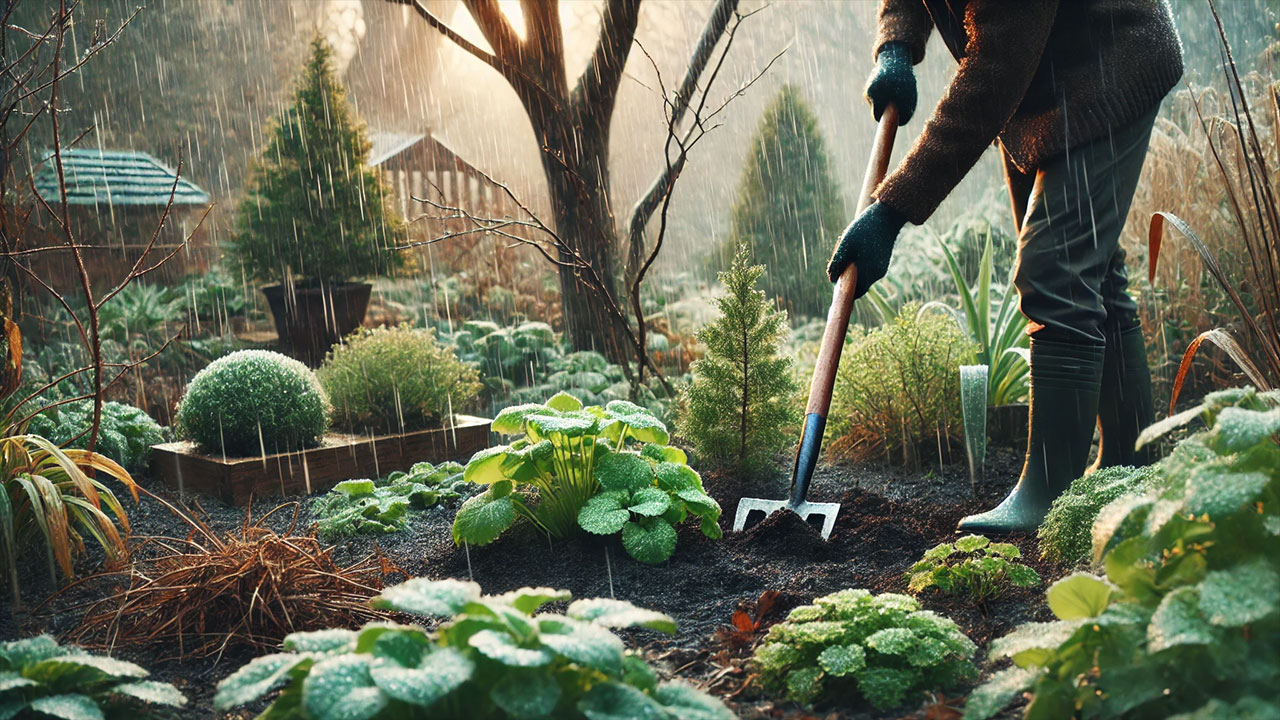
Learn how to manage winter weeds and pests with simple tips to keep your garden healthy and thriving all season long.
Winter in Southern California may bring cooler temperatures and occasional rains, but it’s also a time when weeds and pests can quietly take hold in your garden.
By addressing these challenges early, you can prevent them from becoming major problems as the growing season progresses. Winter rains often stimulate the growth of weeds, which can quickly compete with your plants for nutrients, water, and sunlight.
The best time to address weeds is when they’re young and their root systems are still shallow. Use a hoe or hand-pull them after a rain when the soil is soft, making removal easier.
Apply a thick layer of organic mulch around your plants and in garden beds to suppress weed growth. Mulch not only inhibits weeds but also conserves soil moisture and regulates temperature.
In areas with persistent weed problems, applying a pre-emergent herbicide can prevent seeds from germinating. Be cautious and select products that are safe for your garden’s specific plants.
While winter pests may not seem as active as they are in warmer months, several species thrive in cool, damp conditions.
Common culprits include snails, slugs, aphids, and fungal diseases. These pests love the moist environment and cooler winter weather. They feed on tender seedlings and leafy greens, leaving behind telltale holes and slime trails.
Hand-pick snails and slugs in the early morning or evening when they’re most active. Place barriers around plants, such as copper tape or diatomaceous earth, which deters these pests naturally.
Aphids can appear during mild winter days, clustering on tender new growth and sucking plant sap. Wash them off with a strong jet of water or use insecticidal soap. Introduce natural predators like ladybugs and lacewings to keep aphid populations in check.
Cool, wet weather can lead to fungal problems such as powdery mildew and rust. Ensure good air circulation by spacing plants properly and pruning overcrowded areas.
Remove and dispose of infected plant material to prevent the spread of disease. Apply organic fungicides as a preventative measure if you’ve experienced recurring issues in the past.
Some pests, such as whiteflies and scale insects, can overwinter on plants. Inspect stems and the undersides of leaves for eggs or adult insects.
Prune heavily infested areas and treat remaining plants with horticultural oil to smother pests. Clear away fallen leaves, spent plants, and other debris that provide shelter for pests and weed seeds.
Keep compost piles well-managed to avoid creating a haven for unwanted visitors.
With a little effort now, you can ensure your garden remains vibrant and productive throughout the year.
For more tips on preventing weeds, you may also like Effective Winter Weeds Control Tips.
Discover Beautiful Flowers, Expert Gardening Tips & Interesting Plant Science!
By submitting this form, you are consenting to receive marketing emails from: . You can revoke your consent to receive emails at any time by using the SafeUnsubscribe® link, found at the bottom of every email. Emails are serviced by Constant Contact

About The Author
John Bagnasco has been in the gardening industry for over 50 years, starting with a horticulture degree from Michigan State University and following a stint at Frank’s Nursery and Crafts in Detroit.
After publishing his first book “Plants for the Home Vol. I” in 1976, he moved to California to become regional manager and buyer for the Nurseryland division of Sunbelt Nursery Group.
He then became the head buyer for Armstrong Garden Centers based in Glendora, California. John had a part-time affiliation with Creative Promotions for ten years before joining them full-time in October 2000 as a senior editor and radio personality for Garden Compass.
John has also taught horticulture classes at Palomar College and San Diego State University.
He is the host of the DVD “The Essential Guide to Roses,” which also features Bryan Main and Bruce and Sharon Asakawa.
His most recent book is “Planting Designs for Cacti and Succulents”.
Currently, John is a co-host on “Garden America,” an interactive live gardening show that additionally provides podcasts of the broadcasts accessible on all major platforms.
You can contact John here.
